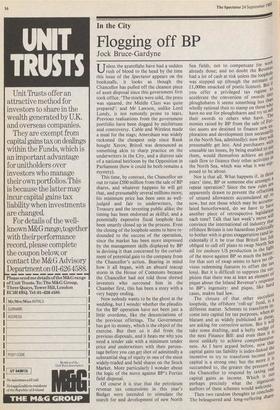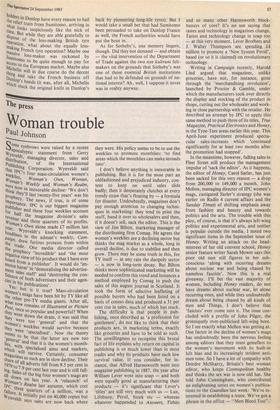In the City
Flogging off BP
Jock Bruce-Gardyne
nless the ayatollahs have had a sudden V rush of blood to the head by the time this issue of the Spectator appears on the bookstalls, it looks as though the Chancellor has pulled off the cleanest piece of asset disposal since this government first took office. 'The stocks were sold, the press was squared, the Middle Class was quite prepared': and Mr Lawson, unlike Lord Lundy, is not remotely prone to tears. Previous realisations from the government portfolio have been dogged by misfortune and controversy. Cable and Wireless made a meal for the stags; Amersham was widely reckoned the cheapest snip since Rank bought Xerox; Britoil was denounced as something akin to sharp practice on the underwriters in the City, and a distress sale of a national heirloom by the Opposition in Parliament (how it could be both remains a mystery).
This time, by contrast, the Chancellor set out to raise £500 million from the sale of BP shares, and whatever happens he will get that, and presumably several millions more; his minimum price has been seen as well- judged and fair to underwriters, the Treasury and the investing public alike; the timing has been endorsed as skilful; and a potentially expensive fiscal loophole has been smartly closed up in the process. Even the closing of the loophole seems to have re- dounded to the success of the operation, since the market has been more impressed by the management skills displayed by BP in devising it than concerned by the curtail- ment of potential gain to the company from the Chancellor's action. Bearing in mind how it all began, with an absurd teacup storm in the House of Commons because the Chancellor had not told those shrewd investors who surround him in the Chamber first, this has been a story with a very happy ending.
Now nobody wants to be the ghost at the wedding, but I wonder whether the plaudits for the BP operation have not been just a little overdone, like the denunciations of the previous offerings. The Government has got its money, which is the object of the exercise. But then so it did from the previous disposals, and it beats me why you need a tender sale with a minimum tender price and underwriters with their percen- tage before you can get shot of admittedly a substantial slug of equity in one of the most widely-traded and held shares on the Stock Market. More particularly I wonder about the logic of the move against BP's Forties field disposal.
Of course it is true that the petroleum revenue tax concessions in this year's Budget were intended to stimulate the search for and development of new North
Sea fields, not to compensate for work already done; and no doubt the Revenue had a lot of cash at risk unless the looptnne
was stopped up (though the estimate of
11 £1,000m smacked of poetic licence). But t1 you offer a privileged tax regime o accelerate the conversion of swords into ploughshares it seems something less than wholly rational then to stamp on those wh,n, have no use for ploughshares and try to sell their swords to others who have. The monies raised by BP from the sale of F.01.' ties assets are destined to finance new ex' ploration and development (not necessarily. in the North Sea, admittedly): now they will presumably get less. And purchasers with unusable tax losses, by being enabled to use them, would themselves achieve an extra cash flow to finance their other activities in the North Sea, which was what it was OP' posed to be about. Nor is that all. What happens if, in three years' time, BP or someone else attempts a repeat operation? Since the new rules are apparently drawn to prevent the offsetting of unused allowances accumulated UP to now, but not those which may be accurne lated henceforward, do we have to have another piece of retrospective legislation, each time? Talk that last week's move convince the international oil industry that offshore Britain is too hazardous politically to bother with is gross exaggeration (and in cidentally if it be true that Britoil has felt obliged to call off plans to swap North Sea oil for onshore US production in the light of the move against BP so much the better: for that sort of swap seems to have no ob- vious redeeming features to offset the tax loss). But it is difficult to suppress the picion that there was at least an element 0. pique about the Inland Revenue's respont to BP's ingenuity: and pique, like bar' cases, makes bad law. The closure of that other succulent loophole, the offshore `roll-up' fund, is a different matter. Schemes to transform in" come into capital for tax purposes, when as blatant and as widely publicised as these, are asking for corrective action. But it take some drafting, and a hefty wedge iof the next Finance Bill: and even then it is most unlikely to achieve comprehensive ness. As I have argued before, now that capital gains tax liability is index-linked the incentive to try to transform income int? capital is a strong one; but the more it is succumbed to, the greater the pressure 011 the Chancellor to respond by taxing Nat capital gains as income. Which is no perhaps precisely what the ingenious authors of these schemes would welcome.
Then two random thoughts to conduce The beleaguered and long-suffering share" holders in Dunlop have every reason to hail the relief train from Sumitomo, arriving in What looks suspiciously like the nick of
time. But while they are able gratefully to dispose of the loss-making British tyre operation, what about the equally loss- making French tyre operation? Maybe one Massive loss-maker was reckoned by Sumitomo to be quite enough to pay for access to the European market. Maybe also Michelin will in due course do the decent thing and take the French business off Dunlop's hands (it was, after all, Michelin which stuck the original knife in Dunlop's
back by pioneering long-life tyres). But I would take a small bet that had Sumitomo been persuaded to take on Dunlop France as well, the French authorities would have put the boot in.
As for Sotheby's, one memory lingers, though. Did they not demand — and obtain — the vital intervention of the Department of Trade against the two nye kultruni felt- makers on the grounds that Sotheby's was one of those essential British institutions that had to be defended on grounds of na- tional interest? Ah, well, 1 suppose it never was in reality anyway.







































 Previous page
Previous page